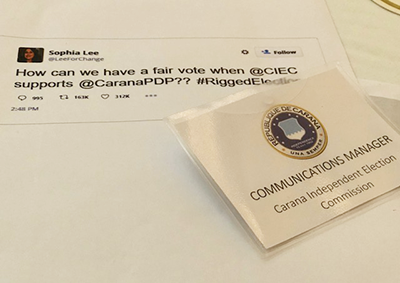
New Executive Training Curriculum Builds the Resilience and Independence of Electoral Leaders
The responsibility for delivering a credible election is a critically important and daunting mandate in any country. Electoral leaders often operate at the center of fundamental power transitions and under enormous political pressure, while facing uniquely complex challenges to their independence. The integrity of an electoral process – and the acceptance of election outcomes – can often hinge on the independence, ethics and crisis leadership demonstrated by those at the helm of the process.
Commissioner Ishwori Prasad Paudyal has noted such challenges in his work at the Election Commission of Nepal and across the region: “Both de facto and de jure independence are preconditions for free, fair and credible election but most of the [election commissioners of Asia] have not been sufficiently empowered to be fully independent.”
This role has become even more challenging with the proliferation of new media and election technologies that offer bad actors evolving opportunities to undermine electoral institutions, processes and public perceptions.
Over the past 18 months, the International Foundation for Electoral Systems (IFES) has been designing and pilot testing the IFES Executive Curriculum in Electoral Leadership (iEXCEL), a new program to help electoral leaders prepare for and overcome these challenges. The program is a unique contribution to the democracy and governance field, as it draws on IFES’ 30 years of experience working with election management bodies (EMBs) around the world. It also utilizes data from a global survey and in-depth interviews from current and former electoral leaders to create real-life scenarios that help trainees test skills and insights throughout the program. Finally, it builds on prior IFES training initiatives and simulations that have been tested globally.
iEXCEL develops skills to strengthen institutional independence, deliver elections within the context of a crisis, resist manipulation of elections by political actors and foster institutional resilience and capacity. IFES piloted the curriculum in August 2018 with electoral leaders from 10 countries across the Asia-Pacific region.
The mix of countries represented at the pilot facilitated a rich discussion and sharing of experiences that impacted participants’ preparations for future elections. As Mohammed Saneem from the Fijian Elections Office (FEO) shared in April 2019, “[iEXCEL] allowed me to test the FEO’s practices in terms of election management with the electoral leaders from around the region […] and to obtain peer reviews of various initiatives at the FEO. This proved extremely useful in the conduct of the [November] 2018 general election.”
“The iEXCEL curriculum was without a doubt relevant and timely… The simulation was really valuable and provided a glimpse of Election Day reality.” – iEXCEL pilot participant
The curriculum has built-in adaptation guidance and can be implemented with participants from a single or multiple EMBs, as a retreat for existing leaders, an orientation for new leaders, or a rapid response measure before a challenging election. iEXCEL can also be delivered as part of a long-term institutional-strengthening program with the EMB that includes ongoing mentorship and peer learning.
Development of the curriculum was made possible with support from the United States Agency for International Development (USAID) through the Consortium for Elections and Political Process Strengthening (CEPPS), as part of the Global Elections and Political Transitions Program. The curriculum will be launched with USAID in the coming weeks.
Established in 1995, CEPPS pools the expertise of three premier international organizations dedicated to democratic development: IFES, the International Republican Institute and the National Democratic Institute. CEPPS has a 20-year track record of collaboration and leadership in democracy, human rights and governance support, learning from experience, and adopting new approaches and tools based on the ever-evolving technological landscape.














